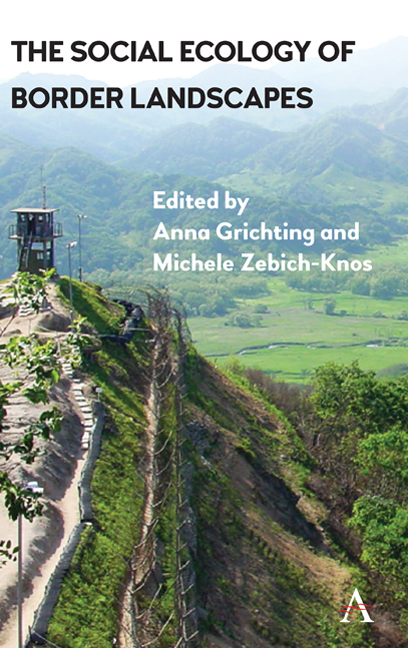Book contents
- Frontmatter
- Contents
- List of Illustrations
- Preface
- List of Contributors
- Introduction: Social Ecologies and Borderlands
- Part I FRAMES: MAPPING SOCIAL ECOLOGIES IN BORDER TERRITORIES
- Part II BRIDGES: RESILIENCE, RESTORATION AND RECLAMATION
- Chapter Four Borders as Zones of Experiential Learning: The Case of the Balkans Peace Park Project
- Chapter Five Social Ecologies in Borderlands: Crane Habitat Restoration and Sustainable Agriculture Project in the Democratic People's Republic of Korea
- Chapter Six Socio-ecological Transformations in Riparian Zones: The Production of Spaces of Exclusion and the Uneven Development of Resilience in the Sonoran Borderlands
- Chapter Seven From No-Man's Land to Every-Man's Land: Socio-ecological Approaches to Reclaiming Shared Spaces in Border Landscapes, with Examples from Germany and Cyprus
- Part III CORRIDORS: CATALYSTS AND COLLABORATION IN CONFINED SPACES
- Part IV PORTALS: DIALOGUE, EXCEPTION AND RETERRITORIALIZATION
- Conclusion: Making Sense of Social Ecology, Borders and the Environment
- Index
Chapter Five - Social Ecologies in Borderlands: Crane Habitat Restoration and Sustainable Agriculture Project in the Democratic People's Republic of Korea
from Part II - BRIDGES: RESILIENCE, RESTORATION AND RECLAMATION
Published online by Cambridge University Press: 10 January 2018
- Frontmatter
- Contents
- List of Illustrations
- Preface
- List of Contributors
- Introduction: Social Ecologies and Borderlands
- Part I FRAMES: MAPPING SOCIAL ECOLOGIES IN BORDER TERRITORIES
- Part II BRIDGES: RESILIENCE, RESTORATION AND RECLAMATION
- Chapter Four Borders as Zones of Experiential Learning: The Case of the Balkans Peace Park Project
- Chapter Five Social Ecologies in Borderlands: Crane Habitat Restoration and Sustainable Agriculture Project in the Democratic People's Republic of Korea
- Chapter Six Socio-ecological Transformations in Riparian Zones: The Production of Spaces of Exclusion and the Uneven Development of Resilience in the Sonoran Borderlands
- Chapter Seven From No-Man's Land to Every-Man's Land: Socio-ecological Approaches to Reclaiming Shared Spaces in Border Landscapes, with Examples from Germany and Cyprus
- Part III CORRIDORS: CATALYSTS AND COLLABORATION IN CONFINED SPACES
- Part IV PORTALS: DIALOGUE, EXCEPTION AND RETERRITORIALIZATION
- Conclusion: Making Sense of Social Ecology, Borders and the Environment
- Index
Summary
Introduction
One of 15 crane species around the world, the Red-crowned Crane (Grus japonensis) of northeast Asia, is divided into a migratory population on the mainland (about 1,400), and a resident population in northern Japan (approximately 1,500), for a total of around 2,900 birds in the wild. Consequently, the International Union for Conservation of Nature (IUCN) considers the Red-crowned Crane Endangered. About 1,000 of the migratory cranes winter on the Korean Peninsula, of which its borderlands within and contiguous to the Demilitarized Zone (DMZ) connecting the two countries are crucial to this species’ continued survival.
Cranes are firmly embedded in Asian culture and have been spiritual icons for millennia, as exhibited in the art of China, India, Russia, Japan and Korea. They symbolize happiness, longevity and loyalty in human societies globally. They are a consummate example of what Edward O. Wilson calls “biophilia,” the “innately emotional affiliation of human beings to other living organisms” — a social ecological concept that gives hope to efforts like the ones described in this volume to reintegrate humankind with nature. In spite of that affection, however, 11 of the 15 species are Vulnerable or Endangered, according to IUCN. Similar threats confront them everywhere: habitat degradation and loss owing to development, pollution, chemically based fertilizers and pesticides, hunting and illegal trade. Murray Bookchin, a father of social ecology, would certainly cite cranes as an unwitting victim of ecological problems caused by practices of human society, which also possesses solutions to these challenges.
This chapter explores the context creating the separation of the two Koreas, its resulting new borderlands and the plight of migratory cranes there; specifics of unique crane habitat restoration and sustainable agriculture work in the Democratic People's Republic of Korea (DPRK) within that setting; project successes to date; and next steps. All aspects of the project have social ecology underpinnings and implications. And they provide one response, in the context of a farm cooperative in North Korea and the Korean Demilitarized Zone, to questions Bookchin poses, of what has been and could be “humanity's place in nature” and “society's relationship with the natural world,” both in creating the divide between humans and nature and in helping to close that gap. The project demonstrates the impacts of redrawn borderlands on the natural world.
- Type
- Chapter
- Information
- The Social Ecology of Border Landscapes , pp. 89 - 106Publisher: Anthem PressPrint publication year: 2017



